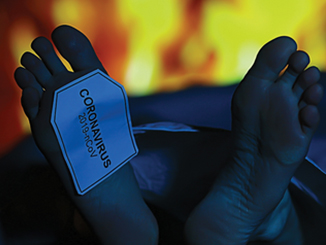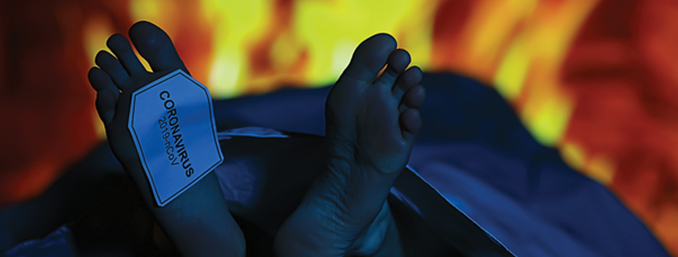

After issuing an official ordinance to stop the forced cremation of Muslims and Christians, as result of an international campaign led by the Justice for All Sri Lankan Task Force, the Sri Lankan government has flip flopped on that decision.
While welcoming the news, Muhammad Muhajid from the Justice for All Sri Lanka Task Force cautioned that Sri Lanka has a long record of violating the rights of non-Buddhists. They were burning Muslim and Christian bodies of those who died of Covid-19 and even those who tested negative. 70% of the total dead due to COVID-19 in Sri Lanka are Muislims, despite being only 10 percent of the population. Sri Lankan Muslims constitute over nine percent of the country’s total population. Muslims, their masjids, and their businesses have been under attack by Buddhist extremists for years.
Shortly after Pakistan Prime Minister Imran Khan’s visit to Sri Lanka last week, the Sri Lankan government announced on February 26 that it would remove the ban on burials of those who have died to Covid-19, which has been in place since March, 2020. Less than a week later, the government stated that they could only be buried on the island of Iranathivu, which is 300km, or 186 miles northwest of Colombo, the capital. Prior to the Pakistan PM’s visit, the Sri Lankan Parliament had cancelled their meeting with him for fear of him raising concerns of the forced cremations.
Iranathivu houses 165 families who are mostly Tamil Catholics and returned to the island in 2017 after 25 years of displacement. Many residents have already spoken out in protest saying that these loved ones need to be buried with their families at their own burial grounds, not on this island.
For the average person to be able to reach Iranathivu would be expensive, inconvenient and add to the trauma of losing a loved one. Of the over 450 Covid deaths in Sri Lanka, nearly 300 have been those of minorities; both Christians and Muslims bury their dead.
Burials would only be allowed in specific areas in the East. in the Soodupaththinachenai area in Oddamavadi, Batticaloa. This area is 200 km from Columbo.
The government keeps changing rules and is making it really hard for Muslims. They should be allowed to bury where the families are.
This is not the first time in the past month that Sri Lanka’s government has gone back on its word in regards to forced cremations. On February 10, Sri Lankan Prime Minister Mahinda Rajapaksa responded to a Parliament lawmaker that he would allow those who died to Covid-19 to be buried, but within days, at least three Muslims had still been forced into cremation, as the Prime Minister has no authority to make such changes to the law.
Forty-nine American and Canadian Muslim organizations, along with Pakistani Americans, signed on the Justice For All letter to Pakistan’s prime minister Imran Khan to ask Sri Lanka to stop forced cremation during his trip to Sri Lanka. The letter was delivered directly to Prime Minister Imran Khan just before his trip, and an earlier memo was delivered to Pakistan’s Foreign Ministers which may have led to the change in Sri Lankan practice of cremations of Muslims and Christians.
Justice For All also worked closely with American Buddhists-led teams who have been concerned with the state of Human Rights in Sri Lanka. A team is consistently working in Geneva, Switzerland, to ensure that the United Nations Human Rights Council passes the resolution on Sri Lanka to abide by its promises on human rights.
The United Nations Human Rights Council will debate the recent report produced by the Office of the High Commissioner for Human Rights (OHCHR) at the upcoming session in March. It reports Sri Lanka’s deteriorating human rights situation that risks the recurrence of the grave violations of the past, in which an almost genocide of Tamils took place.

Leave a Reply